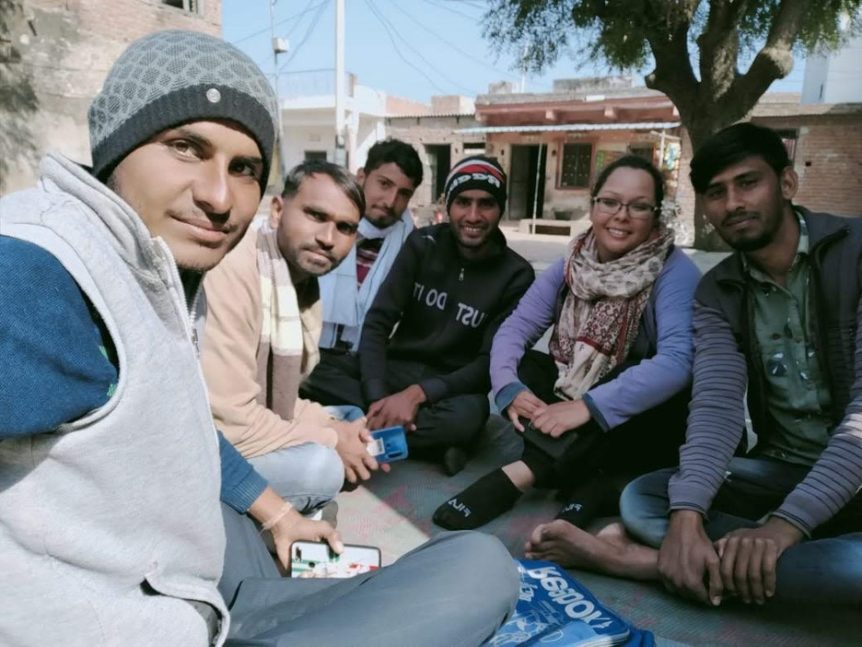Above: 10th Class Leland Fellow Isis Blanco Vera (2nd from right) takes a break with data collectors during a training in Rajasthan
Fighting hunger by developing leaders. This is the Congressional Hunger Center’s motto and reflects what the Mickey Leland International Hunger Fellowship has meant to me. In the beginning of the fellowship, we were required to take a strengths assessment to categorize individual personal strengths and use those insights to develop our leadership skills. After taking the questionnaire, I learned my top two strengths were Includer and Arranger. An Includer makes efforts to make people feel accepted and involved, particularly those who are not usually heard. Arrangers use their effective flexibility to get things done the best way possible.
As a Monitoring and Evaluation Specialist for the International Food Policy Research Institute (IFPRI), part of my job has been to support the impact assessment for the Foundation for Ecological Security (FES). The first year of my fellowship sent me to the FES headquarters in Anand, India, where I immediately took part in a planning workshop with FES leadership and international partners. Although I was a little intimidated to be thrown into a high-level meeting where people had known each other for years, and only armed with limited background information, I was nevertheless excited to learn and to dive right into my new position. FES was preparing to launch a new initiative to use its intervention model to restore 30 million acres of degraded common lands—shared resources owned and managed at the community level—by 2023. However, despite being founded over 20 years ago and implementing its core model in nearly 20,000 villages, FES had not evaluated long and intermediate outcomes at a large scale. In collaboration with international partners such as IFPRI, FES was conducting an ambitious study: a quasi-experimental impact assessment of 72 villages where FES had previously worked and 216 statistically similar but “untreated” counterparts. Besides collecting data to evaluate the effects of FES’s core model, data collected would be aimed at optimizing FES’s intervention model. Part of my duties were to bring my skills in data management, organization, and collaboration to support FES’ study team, particularly the impact assessment study team. I couldn’t wait to see what systems were in place and to help improve where possible.
I quickly realized that the day-to-day work was done by FES staff who had not been at the planning meeting. I made it my mission to include them in future conversations they had previously been excluded from and requested my host organization to let me visit the regional offices as soon as possible. I wanted to understand the complex work that FES did and how it tied to solving hunger. By combining ecological conservation and local self-governance, FES wanted to improve the living conditions of the local people. Participating in community meetings, despite not speaking the language, helped me get a glimpse of how our future focus group discussions would be held. But more importantly, sharing meals while taking a break from collecting ecological data helped build connections. I went from observing community meetings from the outside to sitting in the circle. Experiences like plucking freshly roasted green gram from a smoldering fire will forever be imprinted on my mind. My visits to the villages also helped me when I started setting up the data management systems because I recognized the villages where I had previously been and made this usually routine task, dare I say, fun.

Observing a community exercise in Odisha
Supporting the impact assessment study required relearning, and sometimes unlearning, skills. My previous work at USAID meant I had a preconceived idea of what indicators should be used. However, reality is far more complicated. As a local NGO, FES has reporting requirements from multiple donors as well as their own monitoring indicators. IFPRI as a research organization also has their own parameters. There are also logistical limits to what can feasibly be collected by data collectors in regional offices, as well as balancing keeping private information safe but still allowing the use of data. After much deliberation, ecological, socio-economic, and institutional indicators were agreed upon and the job of creating data collection instruments began. As an Arranger, I constantly look for ways to improve existing systems. I created a data matrix to see which indicators could be multi-purpose, fulfilling multiple donor requirements. I also looked at what data FES already collected and how it could be used. In this way, I supported the creation of household surveys as well as the focus group discussion guides.
The impact assessment team got as far as piloting the survey instruments before COVID-19 halted work. India’s strict lockdown meant no traveling was allowed. Like the other fellows in my cohort, my work drastically changed. After it became obvious conducting household surveys would not be possible, we began exploring how the survey could be administered over the phone. Zoom meetings have become part of my regular life. We often say that food insecurity isn’t a linear problem, but neither is leadership development. I will take the lessons I learned and the experience I have gained from this fellowship with me to help me be a better leader.

